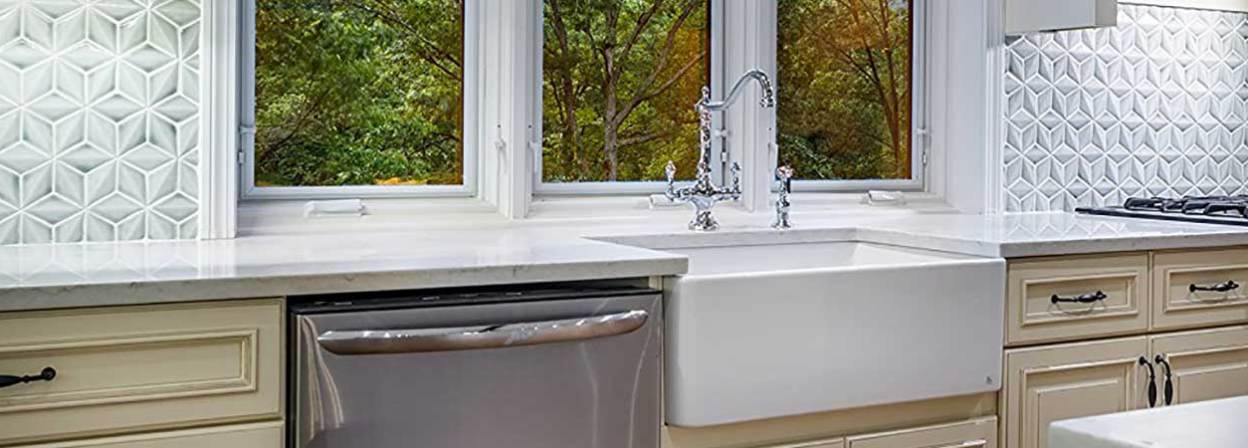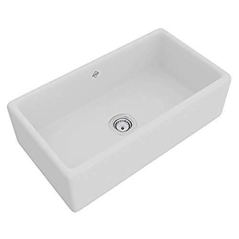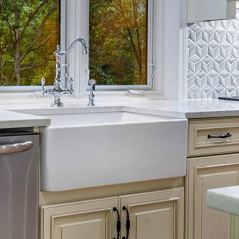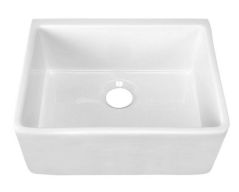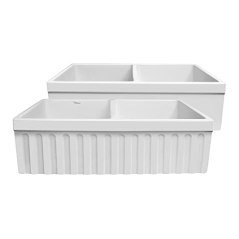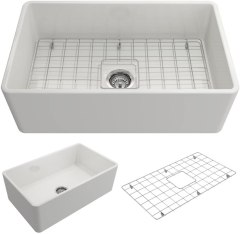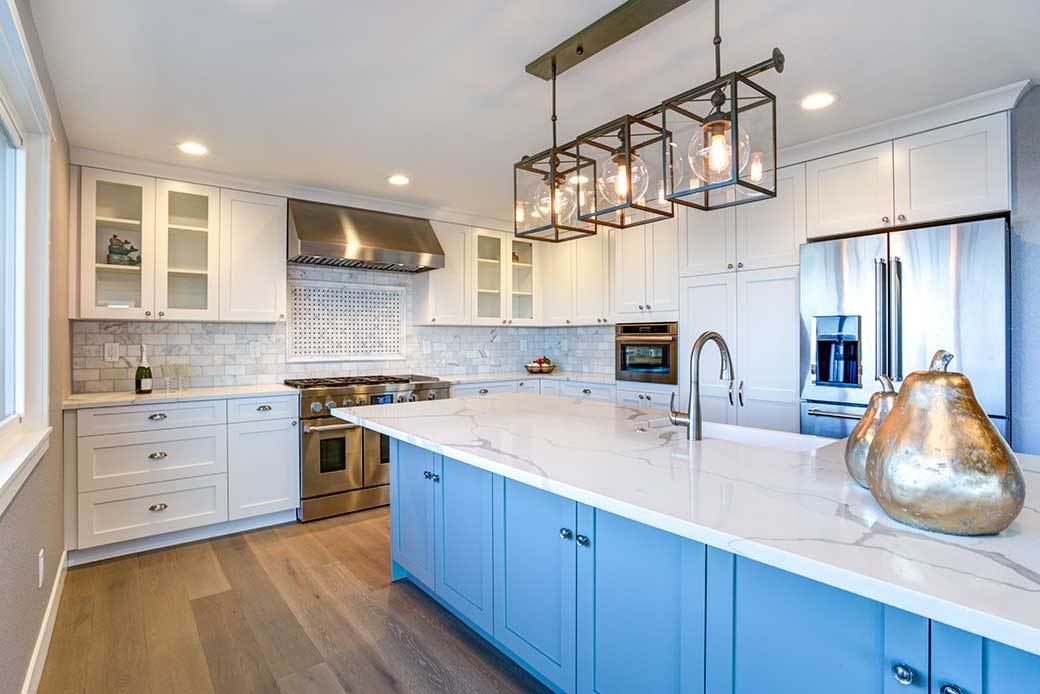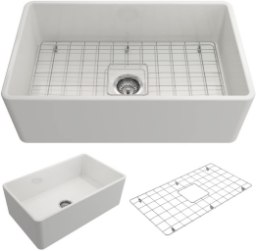Buying guide for best fireclay sinks
If you love the charming country kitchen look of a farmhouse sink, you may want to invest in a fireclay sink. A fireclay sink has a tough, molded ceramic body with a smooth, glossy porcelain finish. Fireclay is non-porous, which means the sink is stain- and acid-resistant. The ultimate appeal of a farmhouse fireclay sink is its durable, deep, and spacious basin, which adds a touch of timeless vintage style.
A farmhouse sink, also called an apron sink or an apron-front sink, often becomes the focal point of a kitchen. Farmhouse sinks do come in other materials besides fireclay, but it’s the handcrafted, tough-yet-smooth quality of ceramic fireclay that makes it so desirable in a rustic-style kitchen.
Every manufacturer’s fireclay sinks have their own look and feel. Some feature a rounded design, and some emphasize sharper edges. There’s a fireclay sink for nearly any kitchen aesthetic — whether it’s modern, country, or a blend.
Key considerations
Drain position
Regardless of what style or material of sink you choose, always consider where your drain is located before selecting a sink. The drains of a sink can be centered, offset to the rear, placed in a corner, or off to one side. Center location for a drain is most common.
Garbage disposal-compatible
If you have a garbage disposal or plan to add one to your farmhouse sink, talk to your installer and plumber. Most farmhouse sinks are compatible with garbage disposals, but some may need an extended flange to attach correctly.
Size
The most important dimension is the length of your sink from side to side. Although sink sizes vary, the most common length of a farmhouse sink is 30 inches. There are smaller versions that measure 24 inches and larger sizes that are typically 36 inches. Make sure the length you prefer works with the size of cabinet you choose.
Depth
The average depth of a farmhouse sink is 8 to 10 inches. Typically, the apron of a farmhouse sink is about 10 inches deep, generally the same depth as the actual basin. Consider your own height before going too deep with your sink: taller people sometimes find it uncomfortable to reach way down into a deep sink.
Features
At first glance, it may appear that all fireclay sinks, especially apron-front farmhouse styles, look alike with few discernible differences. There are, in fact, many variations within the traditional universe of fireclay sinks.
Dual or single basin: Original farmhouse sinks were big basins that held water drawn from outdoor wells. Today, many farmhouse sinks adhere to the traditional single-basin style, but double-basin sinks are becoming more common, and there are even some triple-basin options.
Colors: Fireclay sinks come in limited colors, typically white, cream (or biscuit), and black. You can also find fireclay sinks in shades of gray and blue. The colors available vary by manufacturer.
Metal grid strainer: Some manufacturers offer a removable metal grid strainer for the bottom of the basin for extra protection.
Interior rim: Certain models may include a “step-down” interior rim or lip, which allows you to add accessories, such as a cutting board or floating dish drainer.
Slanted interior: A basin with a slightly slanted interior allows liquids and food to slide down into a drain. For the slant to be effective, the sink needs to be correctly installed to avoid water or debris piling up in the far corners of the bowl.
Apron design: If you want to add a little flair to your farmhouse sink, look for a design that has a slightly bowed apron, or one with flourishes on the front. Some designs include fluted or sculpted grooves and panels. Other sinks feature floral or geometric patterns along their edges.
Reversible: Many farmhouse sinks are considered reversible. This means that the front and back are identical so the drain can be installed on the left or the right according to the position of your plumbing.
Logo: Some manufacturers stamp the company or brand’s insignia either inside the bowl or on the front apron, as was the custom with old-fashioned apron sinks. Though many users love the nostalgic quality of a visible logo, others prefer a logo-free surface.
Fireclay sink prices
Inexpensive: In the $300 to $400 range, you’ll find most 24-inch fireclay apron sinks in white or biscuit. In this price range, you’ll find smaller prep sinks that are circular and oblong, with a rare few in blue or other dark colors. A few 30-inch fireclay sinks are available at this price point, along with traditional non-apron undermount kitchen sinks of fireclay. Note that fireclay bathroom sinks are relatively inexpensive (many under $200) compared to fireclay kitchen sinks.
Mid-range: Most fireclay farmhouse sinks can be found in the $400 to $600 range. You’ll see mostly 30-inch-long single-basin offerings here, and a few double-basin sinks at the upper end of the mid-range. Sinks at this price point will be mostly white or off-white biscuit colors, and a few will have curved apron designs. A number of manufacturers offerings in this price range include protective metal grids for the bottoms of their sinks.
Expensive: High-end fireclay sink prices range from $600 to $1,300. Double-basin models are more common at this level, and you’ll find fireclay sinks offered in more colors, including blacks, grays, and blues. Also, apron designs in this price range may be more decorative, including sink models featuring curves, contrasting colored markings, and filigree designs. Some higher-priced models include faucet kits.
Tips
- Most fireclay sinks need a wall-mounted or counter-mounted faucet. This is because the body of a fireclay sink is designed with slim edges that can’t fit a faucet mount. One of the most popular faucet styles for a fireclay farmhouse sink is the English country-style bridge faucet. To add a more modern touch, opt for a tall, arched restaurant-style faucet.
- One of the best ways to maintain a fireclay sink is to wax it. The sink wax will give the fireclay material a shine. It’s recommended to wax a sink about once a month. Look for products labeled “cleaning wax,” “kitchen wax,” or “appliance wax.”
- Fireclay sinks also come in sizes that fit a butler’s pantry or prep sink on a kitchen island. For these purposes, you can find circular fireclay prep sinks that measure 17 or 18 inches in diameter. An oblong prep or bar sink typically measures 12 to 19 inches wide.
FAQ
Q. Why are farmhouse sinks almost always white?
A. White farmhouse sinks are simply classic, which is why they are still in demand today. From the first apron fireclay farmhouse sink crafted by Shaws of Lancashire in England in 1897 to today’s glossy bowls, white remains the most popular color choice. In part, that’s because flaws or chips on white fireclay sinks aren’t as noticeable as they are on colored finishes.
Q. Are all farmhouse sinks undermount?
A. No. Not all farmhouse sinks are apron-style, either. The oversized farmhouse sink originated in Europe and didn’t become popular in the U.S. until the 1990s, when kitchen remodeling was all the rage. Still, as far back as the 1920s, there was an Americanized version of the white farmhouse sink: It was a freestanding cast iron version with a backsplash. Today, you can have a farmhouse sink that’s undermount, drop-in, or semi-flush, and pulled forward from the lower cabinetry.
Q. Are there other types of sinks besides farmhouse sinks that are made from fireclay?
A. Yes. Not every fireclay sink is a farmhouse sink, and not every farmhouse sink is made from fireclay. You’ll find traditional drop-in or undermount fireclay kitchen and bar sinks without an apron. Also, they can be square, rectangular, or even circular. There are also fireclay sinks for bathrooms, many in contemporary shapes for above-counter installation.

